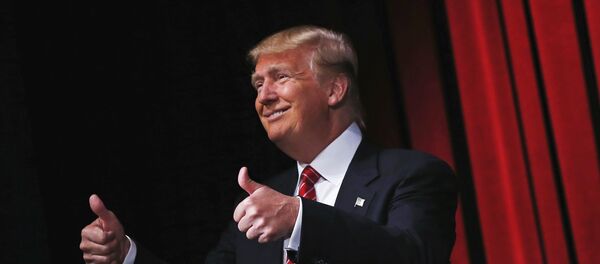Can we call Donald Trump pro-Russian, and what is his real position on Russia and the crisis in Ukraine? How does American public opinion reflect his position?
Avigdor Eskin: When somebody calls Donald Trump pro-Russian, let me tell you a very short story from Washington, in 1982 or 1983. There was an attempt by the CIA to blow up something in Nicaragua, and the operation failed. The chairman of the Senate Select Committee on Intelligence, Barry Goldwater, who was the arch anticommunist as you remember, made a statement against this CIA operation, and I remember somebody from the young Republicans getting up and saying, "Oh, Barry Goldwater is a Communist!"
So, as much as Barry Goldwater is a Communist, Donald Trump is in a sense pro-Russian.
But, he is pro-American, and he understands that American interests are very different from what Barack Obama perceives as American interests, or Hillary Clinton.
He was very simple, smart to say that the Ukrainian issue should be dealt with by Ukrainians, Russians, should be dealt with basically by the Europeans.
As far as Russia is concerned, Donald Trump understands what American interests are. And when he says that he wants to make a deal with Mr. Putin, and to do business with the Russian president, he means business, as a businessman.
And when he speaks about Ukraine, he cannot understand what the US interests are.
He didn't go to defend Russian interests somewhere in Nicaragua, and he didn't go to Cuba to defend Russian interests, as the American president does in Libya, in Syria, quite far away from Washington D.C.
So this is the logic of Donald Trump, and this logic is picked up by other candidates. You don't hear, during this election campaign, any anti-Russian rhetoric. You hear rather the appeasement rhetoric – from those who are on the right. Very interesting.
It's a really good point that you mention, that Donald Trump is first and foremost a businessman.
Avigdor Eskin: Absolutely – an American businessman.
I also like the fact that you mentioned politically incorrect. You know who else is politically incorrect – Israel.
Avigdor Eskin: Our very existence is very politically incorrect. Many people want us to just cease to exist, but for some reason we want to live.
There has been a recent story about Israel invading Syria, amid rocket attack fears. Is Israel going to invade, or will it be some sort of pre-emptive strike against ISIS?
Avigdor Eskin: Well not everything which is prophesied by the Western press comes into existence.
Talking seriously, there was already an attempt from the Syrian side at infiltration, by a terrorist group, by the so-called ISIS. The Syrian government left this whole area. Doesn't control the border with Israel. And it's now kind of ironic – not for me, I was on the side of President Assad from the very beginning of the conflict. But not every Israeli was, Israel was divided and many people in Israel actually wanted Assad to fall.
So yes, there are talks about some kind of military operation.
Israel is willing to defend the border and Israel needs to be prepared for military action on the territory of Syria against those who are President Assad's enemies. But of course, Israel's preference will be that President Assad will take over this whole territory near the border with Israel. This was the most peaceful border since 1973.
Syria and Israel?
Avigdor Eskin: You cannot even compare it with the border with Egypt, because there were many more terrorist acts from the Egyptian side against Israel, not controlled by the government necessarily of course.
The border with Syria was absolutely quiet, for more than 40 years. And now it's not.



